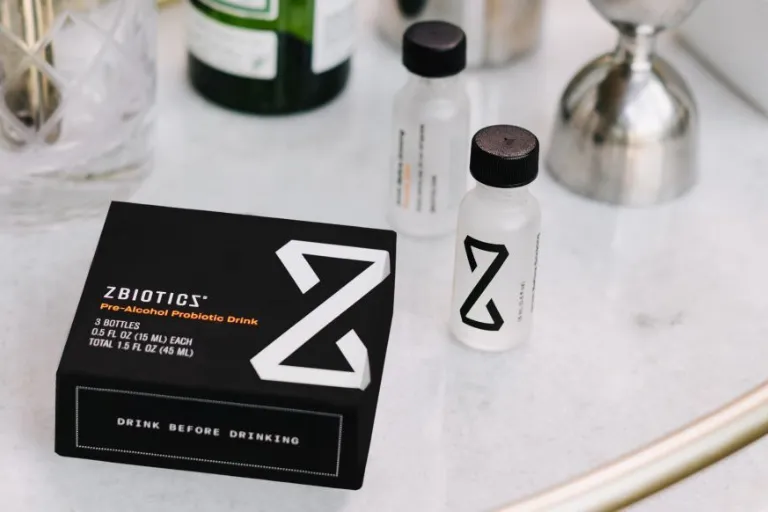Die Suche nach einem zuverlässigen Katermittel ist so alt wie das Trinken selbst. Über Kulturen und Jahrhunderte hinweg haben Menschen alles probiert, von fettigem Frühstück über Kräutertees und elektrolytreiche Sportgetränke bis hin zu einer in jüngster Zeit immer größer werdenden Palette an Wellness-Ergänzungsmitteln. Das Versprechen ist immer dasselbe: die unangenehmen Folgen übermäßigen Genusses auszulöschen oder zumindest abzumildern.
In den letzten Jahren hat sich diese Suche mit einer wachsenden öffentlichen Faszination für das Mikrobiom überschneidet — die riesige Gemeinschaft von Mikroben in unserem Verdauungssystem, die alles von der Immunität bis zur Stimmung beeinflusst. Dadurch hat sich die Diskussion über die Auswirkungen von Alkohol weg von rein leberbezogenen Erklärungen und hin zur Darm–Gehirn-Verbindung verlagert.
Einer der am meisten diskutierten Einträge in diesem Bereich ist ZBiotics, vermarktet als “voralkoholisches” probiotisches Getränk, das ein wichtiges Toxin neutralisieren soll, das bei der Verarbeitung von Alkohol durch den Körper entsteht. Die Botschaft ist einfach: Helfen Sie dem Darm, mit den giftigen Nebenprodukten des Alkohols umzugehen, bevor diese Probleme verursachen können. Aber wie genau funktioniert das — und wie viel von dem Hype hält an?
Alkohol belastet den Darm: Mehr als nur Magenschmerzen
Der Darm ist die Heimat von Billionen von Mikroorganismen, die zusammen als Mikrobiom bezeichnet werden. Diese Bakterien, Pilze und andere Mikroben erfüllen wichtige Aufgaben wie die Verdauung von Nahrungsmitteln, die Produktion bestimmter Vitamine, das Training des Immunsystems und beeinflussen sogar die Gehirnchemie. Alkohol kann das Gleichgewicht des Mikrobioms auf verschiedene Weise durcheinander bringen:
- Dysbiose: Alkoholkonsum —insbesondere in großen Mengen — kann dazu führen, dass sich schädliche Bakterien vermehren, während nützliche Stämme zurückgehen. Dieses Ungleichgewicht beeinträchtigt die Verdauung, die Nährstoffaufnahme und die Regelmäßigkeit des Darms und führt manchmal zu Blähungen, Gasbildung oder Durchfall.
- Erhöhte Darmdurchlässigkeit (“Leaky Gut”): Alkohol kann die engen Verbindungen zwischen Darmzellen schädigen und die Darmschleimhaut poröser machen. Dadurch können bakterielle Toxine und unvollständig verdaute Nahrungsmoleküle in den Blutkreislauf gelangen und eine systemische Entzündung auslösen.
- Direkte Entzündung: Alkohol reizt den Magen und die Darmschleimhaut. In Kombination mit der Entzündungskaskade durch einen durchlässigen Darm trägt dies zum allgemeinen Unwohlsein eines Katers bei — die Schmerzen, der Nebel, das Gefühl, dass Ihr ganzer Körper “aus ist.”
Über diese Effekte hinaus produziert der Alkoholstoffwechsel Acetaldehyd, eine Verbindung, die deutlich giftiger ist als Alkohol selbst. Während die Leber den größten Teil der Entgiftung übernimmt, entsteht Acetaldehyd auch im Darm beim Abbau von Alkohol durch bestimmte Mikroben. Klassifiziert als Karzinogen der Gruppe 1Acetaldehyd kann Gewebe schädigen und gilt als Hauptursache für Katersymptome wie Kopfschmerzen, Hitzewallungen und Übelkeit.
ZBiotics: Ein Probiotikum mit einer Mission
ZBiotics nimmt dieses Acetaldehydproblem auf neuartige Weise ins Visier. Anstatt sich auf Flüssigkeitszufuhr, Elektrolyte oder Leberentgiftung zu konzentrieren, konzentriert es sich auf die Darmbasierte Produktion und Abbau von Acetaldehyd.
Das Getränk enthält eine gentechnisch veränderter Stamm von Bacillus-subtilis — ein probiotisches Bakterium mit einer langen Geschichte der sicheren Verwendung in Lebensmitteln wie Natto. Dieser Stamm wurde modifiziert, um zu produzieren Acetaldehyddehydrogenase, dasselbe Enzym, das die menschliche Leber verwendet, um Acetaldehyd in Acetat umzuwandeln, eine viel weniger schädliche Verbindung, die sogar zur Energiegewinnung genutzt werden kann.
Mehrere Designentscheidungen machen diesen Ansatz möglich:
- Bacillus-subtilis ist ein sporenbildendes Bakterium, wodurch es die Magensäure überleben und den Darm intakt erreichen kann.
- Der in ZBiotics verwendete Stamm hat GRAS (allgemein als sicher anerkannt) Status bei der FDA, wodurch Sicherheitsbedenken verringert werden.
- indem sie es vor dem TrinkenDie Idee besteht darin, den Darm mit diesen enzymproduzierenden Mikroben “vorzuladen”, damit sie bereit sind, Acetaldehyd bei seiner Bildung zu neutralisieren.
Die Wissenschaft: Was wir wissen und was nicht
Auf dem Papier macht das Konzept Sinn. Wenn Sie den Acetaldehydspiegel im Darm senken können, bevor er in den Kreislauf gelangt, könnten Sie theoretisch einige der toxischen Wirkungen von Alkohol abschwächen. ZBiotics hat kleine, interne placebokontrollierte Studien durchgeführt und berichtet, dass bei Anwendern am nächsten Tag mildere Symptome auftraten.
Es gibt jedoch wichtige Vorbehalte:
- Noch keine von Experten begutachteten Studien am Menschen: Obwohl das Unternehmen hinsichtlich seiner Forschung transparent ist, wurden seine Studien nicht in unabhängigen wissenschaftlichen Fachzeitschriften veröffentlicht. Ohne große, doppelblinde, placebokontrollierte Studien können wir nicht sicher sein, wie viel des berichteten Nutzens auf die Wirkung des Produkts im Vergleich zu Placebo oder auf die individuelle Variabilität zurückzuführen ist.
- Acetaldehyd ist nicht der einzige Katerverursacher: Dehydration, Immunaktivierung und Schlafstörungen spielen alle eine wichtige Rolle bei der Schwere des Katers. Es ist unwahrscheinlich, dass ein Produkt, das nur auf einen Mechanismus abzielt, die Symptome vollständig beseitigt.
Ein ausgewogenes Urteil
ZBiotics stellt eine clevere Nutzung der modernen Biotechnologie dar — eines der ersten Verbraucherprobiotika, das für einen hochspezifischen Stoffwechselzweck entwickelt wurde. Sein Fokus auf den Darm statt auf die Leber ist innovativ und steht im Einklang mit der wachsenden Wertschätzung der Gesundheit des Mikrobioms für das allgemeine Wohlbefinden.
Für Personen, deren Katersymptome hauptsächlich gastrointestinaler Natur sind — denken Sie an Übelkeit, Magenverstimmung oder dieses “aus” Gefühl im Bauch —, könnte es eine sinnvolle Linderung bieten. Aber es ist kein magischer Schild. Auch wenn es hilft, Acetaldehyd im Darm zu neutralisieren, bekämpft es weder Dehydration noch Immunaktivierung oder Schlafmangel.
Aus medizinischer Sicht könnten ZBiotics eine nützliche Ergänzung in einer umfassenderen Strategie zur Katerprävention sein, die immer noch Mäßigung, Flüssigkeitszufuhr, Ernährung und Schlaf umfasst.
Letztendlich lässt sich ZBiotics am besten als potenziell hilfreiches Instrument betrachten und nicht als Lizenz zum übermäßigen Trinken. Es stellt eine vielversprechende neue Grenze bei funktionellen Probiotika dar — doch wie bei vielen Innovationen wird sein wahrer Wert durch mehr unabhängige Forschung deutlicher werden.
Medizinischer Haftungsausschluss: Dieser Artikel wurde von einem zugelassenen Gesundheitsfachmann verfasst und dient ausschließlich allgemeinen Informationszwecken. Er ersetzt keine persönliche medizinische Beratung, Diagnose oder Behandlung. Bei Fragen zu einer Erkrankung oder zu Gesundheitszielen sollten Leser stets den Rat eines qualifizierten Gesundheitsdienstleisters einholen. Ignorieren oder verzögern Sie niemals die Inanspruchnahme medizinischer Beratung aufgrund der hier dargestellten Informationen.
Referenzen
- Bishehsari, F., Magno, E., Swanson, G., Desai, V., Voigt, RM, Forsyth, CB und Keshavarzian, A. (2017). Alkohol und Darmentzündungen. Alkoholismus, klinische und experimentelle Forschung, 41(8), 1427–1435. https://doi.org/10.1111/acer.13428
- Mackus, M., van de Loo, AJ, Garssen, J., Kraneveld, AD, Scholey, A., & Verster, JC (2020). Die Rolle des Alkoholstoffwechsels in der Pathologie des Alkoholkaters. Zeitschrift für klinische Medizin, 9(11), 3421. https://doi.org/10.3390/jcm9113421
- Penner, JC, Whestine, V., & Kolling, GL (2021). Die Rolle des Darmmikrobioms bei alkoholbedingten Lebererkrankungen. Zeitschrift für Investigative Medizin, 69(6), 1139-1144. https://doi.org/10.1136/jim-2021-001844



